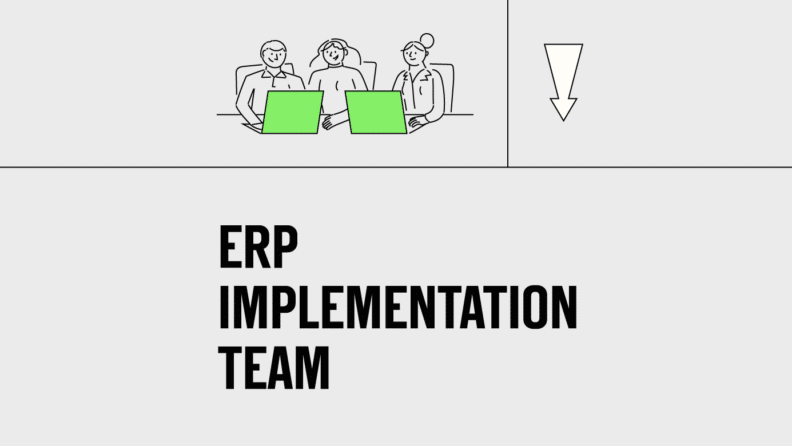Taking the time to structure a perfect Enterprise Resource Planning (ERP) implementation team can go a long way toward ensuring your new system is planned and executed smoothly.
In this article, I'll highlight the key roles and responsibilities needed for ERP (and organizational) effectiveness and discuss some of the top challenges companies face during ERP implementations.
What is an ERP Implementation Team?
An ERP implementation team is a group of individuals responsible for planning, coordinating, and executing the implementation of an ERP system within an organization.
Your ERP implementation team should consist of core members with diverse skill sets and expertise. But that's not all—it's also about having the right personality types, which help to coordinate implementation and achieve optimal results.
Importance of Selecting the Right ERP Implementation Team
I’ve spent 20 years wearing different hats in the business world and seen various personalities involved in the ERP implementation process, as well as how those personalities impacted implementation outcomes.
Here's what I learned about structuring a successful ERP implementation team:
- Having the right technical skills and knowledge is just the beginning.
- Teams with the right traits perform better, with less dysfunction and conflict.
- Cohesive, outcome-focused teams are more likely to meet a project's scope.
The 6 Core Roles of ERP Implementation Teams
Having a well-structured ERP implementation team is critical for implementing any type of ERP system. Your team requires the best mix of skills, knowledge, experience, and traits to ensure that each aspect of the ERP implementation process is handled effectively and efficiently.
It’s estimated that almost 30% of critical roles are not filled by the most appropriate people. If your company is planning an ERP implementation, take a look at some of the critical team roles, traits, and responsibilities of successful ERP implementation teams.
1. Executive Sponsor
This is an internal senior-level executive who champions the ERP implementation project within the organization.
Responsibilities
- Securing the necessary resources
- Providing strategic guidance
- Ensuring that the project aligns with the business goals
- Driving the project forward, with buy-in from key stakeholders
- Facilitating communication between the implementation team and the rest of the organization
Core Traits
- Strategic
- Inclusive
- Collaborative
- Influential
- Supportive
- Visionary
2. Implementation Partner
A third-party organization or consultant that specializes in ERP implementations.
Responsibilities
- System demos, guiding the implementation process, and ERP configuration
- Advising on best practices for system usage
- Working closely with the internal team
- Helping them navigate through the complexities of the ERP solution
- Ensuring a successful implementation and data migration before go-live dates
Core Traits
- Knowledgeable
- Collaborative
- Reliable
- Curious
- Trustworthy
- Capable
3. Project Manager
An in-house or external project leader who oversees the entire ERP implementation project.
Responsibilities
- The ERP project plan
- Driving the work of the project team
- Ensuring that tasks are completed on time, resources are allocated effectively, and risks are managed
- A central point of contact for the implementation team, the executive sponsor, and the implementation partner
- Playing a critical role in keeping the project on track, resolving issues, and communicating progress to stakeholders
- Coordinating change management
Core Traits
- Results-driven
- Facilitative
- Tech-savvy
- Supportive
- Accountable
- Communicative
4. End User, aka Super User
End users, also known as super users, are individuals within the organization who will be actively using the ERP system on a daily basis.
Responsibilities
- Having a deep understanding of the organization's processes, workflows, and requirements
- Acting as a bridge between the implementation team and the rest of the organization
- Providing feedback to ensure that the ERP system meets the organization's needs
- Training and supporting other employees during and after the implementation process
Core Traits
- Knowledgeable
- Hands-on
- Communicative
- Collaborative
- Brutally Honest
- Iterative
5. Cross-Functional Team Members
Internal team members from various organizational departments and functions.
Responsibilities
- Bringing unique perspectives, expertise, and knowledge to the table
- Ensuring the implementation process considers and addresses the needs of the entire organization
- Helping to proactively identify and resolve potential issues
Core Traits
- Vested
- Collaborative
- Communicative
- Representative
- Results-driven
- Supportive
6. Report Writer
The report writer is an internal or external individual responsible for developing custom reports within the ERP system.
Responsibilities
- Working closely with the end users and other stakeholders to understand their reporting needs
- Creating reports that satisfy reporting needs and provide data-backed insights to the organization
- Ensuring that the organization can leverage the full potential of the ERP system's reporting capabilities
Core Traits
- Meticulous
- Organized
- Analytical
- Supportive
- Knowledgeable
How to Ensure Your Team Succeeds
Taking the time to read this article is a great first step; however, there are other concrete things you can put in place to increase the odds of your implementation going through smoothly, including:
Overlapping Traits
Whether they’re from human resources, your IT team, or project team members, your implementation team needs to have some overlap in traits, which will become the basis of your code of conduct.
As you likely saw in the role descriptors above, the most common traits are:
- Inclusive
- Accountable
- Supportive
- Collaborative
One other trait that wasn't mentioned much earlier, but should be present in as many of these roles as possible, is tech-savviness. It’s a must for project managers and implementation partners, as they’re subject matter experts in the selection and implementation of the best ERP software.
Code of Conduct
I've been involved in many ERP implementations and found that the most successful ones had a code of conduct that outlined at least these elements:
- Implementation mission and vision
- Team member responsibilities
- Team values
- Team ethics and integrity standards
- Unacceptable behavior
- Avenues and roles in conflict resolution
Clear and Frequent Communication
Establishing clear communication channels and creating a collaborative environment where team members can freely share ideas, concerns, and progress updates is crucial. Strong communication skills are necessary during regular team meetings, status updates, and feedback sessions to keep everyone aligned and informed throughout the implementation process.
Ongoing Training and Support
One area that I find often overlooked is training and support, especially post-implementation, where users need to know how to use ERP systems. It's where end-users and other stakeholders struggle and consequently become disengaged most often.
Providing adequate training and support for the team is essential. Investing in comprehensive training programs and workshops can equip team members with the necessary knowledge and skills to fully utilize the ERP system effectively—and gain the benefits.
Goal-Setting
Setting realistic goals and expectations is vital for the success of your team. Breaking down the implementation process into manageable phases and milestones can help track progress and give you opportunities to celebrate achievements along the way.
Recognition and Reward System
Recognizing and rewarding team members for their contributions can boost morale and motivation, driving the team toward success.
Most Common Personality Types on an Implementation Team

I know it may sound strange, but choosing team members based on personality types genuinely helps projects succeed. Just as Michael Jordan needed Scottie Pippen, you need to create a balanced team to help your project win.
Speaking from experience, here are some of the most common personality types you’ll encounter on an implementation team:
Take-Charge Thomas
While Thomas is essential for providing direction and motivating others, people might find him extra and, at times, downright exhausting to be around.
In-The-Weeds Ingrid
Ingrid knows that the devil is in the details and what needs to be done to reduce risks. She's logically and methodically checking all the boxes and excels at analyzing complex problems to create practical solutions.
Despite her value, Ingrid can sometimes slow things down too much, frustrating the speed demons on the team who just want to get to the finish line.
Isaac the Innovator
Every company wants Isaac, the innovator. He’s creative, forward-thinking, and always looking for new ways to improve processes and maximize the ERP system's benefits.
Isaac’s awesome, but we have noticed he has a bit of a Steve Jobs complex and tends to hog the limelight sometimes—okay, most of the time, which can really annoy the rest of the team.
Counselor Christine
Another favorite team member, counselor Christine, is skilled at building relationships, fostering teamwork, and facilitating effective communication among team members and stakeholders. She can spend too much time making everyone feel included and valuable and not enough time getting work done.
Christine’s always-on nurturing side is likely to land her on Take-Charge Thomas’ non-performer list.
Frank the Fixer
Frank the Fixer relishes being involved in everyone’s business and finding ways to save the day. He means well, but—as I’m sure you can imagine—not everyone appreciates his two cents. However, he plays an important role in resolving conflicts, managing expectations, and ensuring everyone's opinions and concerns are heard and addressed.
To be effective and have his input appreciated, Frank needs to know when to step in and when to let others mend their own fences.
Shepherd Seth
Seth is driven to succeed and is always on top of the implementation roadmap. He’s highly organized, efficient, and focused on execution, ensuring tasks are completed on time and deliverables are met.
The issue is that he gets so focused on succeeding that team members, especially counselor Christine, see him as an annoying taskmaster. Yes, performance and achievement are vital in ERP implementations, as are building relationships and fostering teamwork.
The key to successfully matching personality types with projects is ensuring everyone is vested in the success of the team as a whole on the same page—not solely on where they personally excel.
Structuring a successful ERP implementation team is crucial for the success of your entire project. Recognizing and leveraging each team member's strengths creates a well-rounded and high-performing team equipped to tackle all aspects and challenges of your ERP implementation.
Subscribe For More ERP Implementation Insights
Ready to compound your abilities as an implementation leader? Subscribe to our free newsletter for expert advice, guides, and insights from the financial leaders shaping the tech industry.



